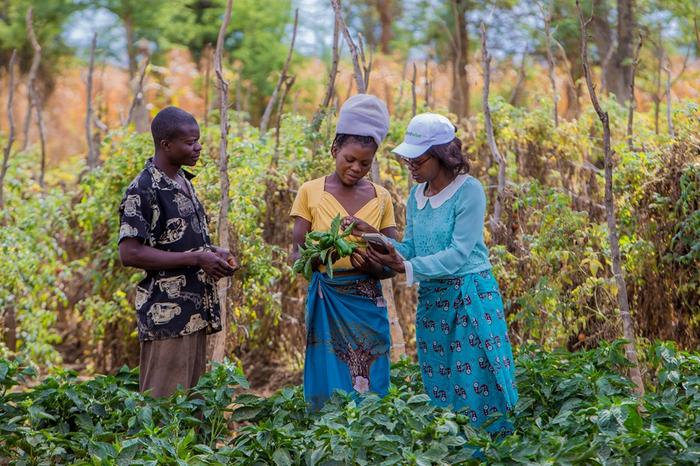
In a groundbreaking policy forum article published in CABI One Health journal, researchers assert the urgent need for the plant health sector to integrate into the One Health framework. The One Health initiative emphasizes the interconnectedness of human, animal, and environmental health, yet often overlooks the significance of plant health, which plays a crucial role in global food security and ecosystems. The authors argue that by excluding plant health from the One Health discourse, critical health challenges remain unaddressed, and opportunities for holistic solutions are lost.
Historically, One Health has focused predominantly on human and animal health, giving priority to zoonotic diseases and the impact of antimicrobial resistance. This limited perspective has inadvertently marginalized plant health, preventing it from claiming its rightful place at the One Health table. The researchers call for a more inclusive approach that recognizes plant health as integral to addressing complex global health problems, such as food safety, pesticide management, and the impacts of climate change on agriculture.
Furthermore, the discourse around plant health often operates in isolation from One Health strategies, resulting in a disconnect that hampers progress toward integrated solutions. The authors emphasize that plant health already intersects with several One Health-compatible fields, including agroecology, sustainable food systems, and integrated landscape management. However, these connections are rarely articulated within the framework of One Health, limiting their potential influence and applicability.
Dr. Solveig Danielsen, a senior project scientist at CABI, highlights the political and institutional advantages of integrating plant health into the One Health framework. By doing so, the plant health sector could leverage the support mechanisms offered by established entities like the Quadripartite Organization of the United Nations and the One Health High-Level Expert Panel. She argues that these platforms are critical for advocating international policies that encompass severe One Health issues, including challenges presented by pesticide use, mycotoxins, invasive species, and biodiversity loss.
Despite the challenges faced in integration, a shift toward recognizing the interconnectedness of health disciplines appears to be gaining traction. For instance, Dr. Danielsen mentions various initiatives demonstrating how a One Health approach can yield innovative solutions in plant health. Such initiatives facilitate a comprehensive understanding of the complex nature of health challenges, urging stakeholders to consider all dimensions of plant health when developing strategies and policies.
The policy forum article further elucidates the idea of “undeclared” One Health work. One striking example outlined is a meta-analysis conducted by Mahon and colleagues, which identifies the drivers of disease risks across human, animal, and plant health domains. Their findings reveal that global challenges, such as biodiversity loss and chemical pollution, significantly correlate with disease outbreaks in both human and non-human populations. This evidence suggests that a consolidated approach could bolster efforts to mitigate these intertwined health risks.
Dr. Urs Schaffner, co-author of the article, complements this discussion by stating that plant health and One Health are defined by their unique concepts. Nevertheless, there exists a shared goal of promoting holistic frameworks. He emphasizes the need for collaboration among diverse professional communities, advocating for unified strategies that recognize the overlapping interests of One Health and plant health. This collaboration can ultimately enhance both sectors’ capacity to tackle global health issues effectively.
As the need for interdisciplinary collaboration becomes increasingly clear, scientists are optimistic about the future of One Health integration. Citing recent works, including a study by Hoffman et al., the authors express hope that applying a One Health perspective can facilitate effective discussions around agricultural practices, particularly regarding the balance between ensuring plant health and mitigating pesticide risks. This kind of dialogical approach may pave the way for innovative policies that serve the broader goals of health equity.
Dr. Jakob Zinsstag, another co-author and Editor-in-Chief at CABI One Health, stresses the collective responsibility of reforming One Health practices. His call to action emphasizes the importance of collaboration across various fields of expertise. By integrating insights from plant specialists, veterinarians, medical professionals, and ecologists, stakeholders can collectively advance the conversation around holistic health solutions.
The authors also point out that the upcoming Quadripartite One Health Joint Plan of Action represents a significant moment for reevaluating and reorienting strategies toward intersectoral integration. They argue that this vital period provides a unique opportunity to break down existing barriers in order to foster a more collaborative approach that includes plant health as a key component of the broader One Health initiative.
Summarizing their arguments, the researchers conclude that the framing of One Health must expand to incorporate plant health, thereby recognizing its integral role in global health discourse. By making strides in interdisciplinary collaboration and policy integration, the health community can work toward a future where human, animal, plant, and environmental health are addressed in a cohesive and impactful manner.
This policy forum is a crucial step forward in bridging the existing gaps between plant health initiatives and One Health strategies, ultimately advocating for a comprehensive approach to health that leverages the unique strengths and expertise across these interconnected domains.
Subject of Research: The integration of plant health into the One Health framework.
Article Title: Worlds apart: Plant health and One Health and a path to convergence.
News Publication Date: 10-Apr-2025.
Web References: http://dx.doi.org/10.1079/cabionehealth.2025.0013
References: Danielsen, Solveig; Schaffner, Urs; Zinsstag, Jakob, ‘Worlds apart: Plant health and One Health and a path to convergence,’ CABI One Health, 10 April, DOI: 10.1079/cabionehealth.2025.0013.
Image Credits: Credit: CABI.
Keywords: One Health, plant health, agroecology, food security, interdisciplinary collaboration, biodiversity, health policy, pest management, ecosystem health.
Tags: addressing climate change in agricultureagroecology and healthfood security and plant healthholistic health solutionsinclusive health frameworkintegration of plant healthinterconnected health challengesOne Health initiativepesticide management strategiesrole of plant health in ecosystemssustainable agriculture practiceszoonotic diseases and plant health





